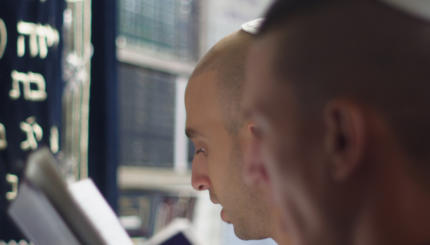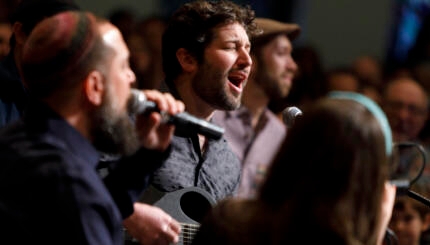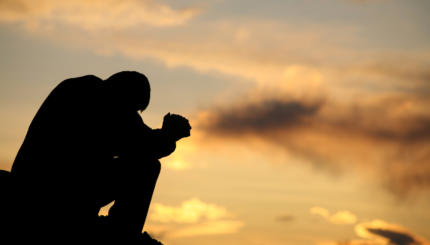Jews traditionally pray three times a day. The morning prayer service, Shacharit, is recited after sunrise and before midday. These prayers are found in any siddur, or prayer book. There are alternate liturgies for weekday, Shabbat and holidays.
For morning prayers, it is traditional to cover one’s head with a kippah and wear a tallit, or Jewish prayer shawl. When it is not Shabbat or a holiday, it is also customary to wrap tefillin around one’s head and arm.

Help us keep Jewish knowledge accessible to millions of people around the world.
Your donation to My Jewish Learning fuels endless journeys of Jewish discovery. With your help, My Jewish Learning can continue to provide nonstop opportunities for learning, connection and growth.
Learn more about Jewish prayer garments.
What follows is an overview of the major highlights of the Shacharit service, though the particulars can vary community and with the day of the week and time of year.
Blessings for putting on tzitzit and tefillin
Before praying, one prepares by putting on the garments of prayer, each of which has its own blessing. Some Jews also wash their hands before prayer, and recite the Netilat Yadayim blessing.
Click here to learn the blessing for putting on a tallit.
Click here to learn how to put on tefillin.
Birkot Hashachar: Blessings of the dawn
Birkot Hashachar is a series of blessings that thank God for the basic good things in life. Originally, they were meant to be recited as soon as one awakens, however they have been bundled and made part of the morning prayer service.
Learn more about Birkot Hashachar.
Pesukei D’Zimra: Verses of praise
Pesukei D’Zimra is a collection of verses from the Hebrew Bible that praise God. Most of them are psalms, though the Song of the Sea, which is found in the Book of Exodus, is also included. Pesukei D’Zimra is considered a prayer “warm-up” designed to develop the kavnnah, or mindset, for the core prayers of Shacharit.
Learn more about Pesukei D’Zimra.
Barekhu: The call to prayer
When Jews pray as part of a quorum of ten adults (a minyan), the Barekhu is recited, signaling the end of preliminary prayers and the start of the core prayer service.
Shema: The Jewish declaration of faith
The Shema, one of Judaism’s best-known prayers, declares that God is one. The Shema is recited twice daily, accompanied by three blessings that meditate on the themes of God’s creation of the world (Yotzer Or), the revelation of Torah at Sinai (Ahava Rabbah), and the ultimate redemption in messianic times (Emet V’Yatziv).
Amidah: Judaism’s central prayer
The weekday Amidah is a sequence of 19 blessings that begin with words of praise, move on to various petitions and close with words of gratitude. The words of the Amidah are fixed, but it is common for Jews to add their own private petitions. Ideally, the Amidah is recited in a minyan, with a quorum of ten other Jews. However, if that is not possible, it is permitted to recite the Amidah individually. On Shabbat, the Amidah is shortened as the petitionary prayers are omitted.
Tahanun
Tachanun is a set of prayers that includes the confession of sins and a request for God’s forgiveness. It is recited on weekdays and omitted on Shabbat.
Torah Reading
The Torah is read as part of a Shacharit service on Shabbat. Shorter sections of the Torah are also read on Mondays and Thursdays. The Torah is only read in the presence of a minyan.
Learn more about the Torah service.
Concluding Prayers
Like other Jewish prayer services, Shacharit wraps up with a collection of oft-recited prayers including Aleinu and Mourner’s Kaddish.



